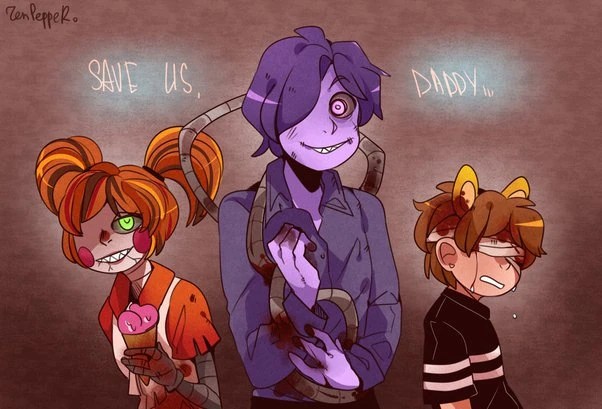William Afton's Family: A Twisted Narrative

The Five Nights at Freddy’s (FNaF) franchise has captivated gamers with its chilling lore and intricate mysteries. Central to the narrative is William Afton, the enigmatic and malevolent mastermind behind a series of tragic events. One of the most debated aspects of his character revolves around his relationship with his family. Did William Afton care about his family, or were they merely pawns in his twisted games?
This question has fueled countless fan theories and discussions, and the answer remains complex and elusive. Afton's actions paint a disturbing picture of neglect and manipulation, leaving many to believe he was incapable of genuine affection. However, scattered fragments of in-game evidence hint at a more nuanced portrayal, suggesting that perhaps some semblance of familial connection existed beneath his sinister exterior.
Understanding Afton's motivations requires delving into the FNaF storyline. Afton, a brilliant robotics engineer and entrepreneur, co-founded Fazbear Entertainment and designed the animatronic characters that would later become instruments of terror. His descent into madness and obsession with immortality is intricately linked to his family's fate.
The impact of William Afton's actions on his family is undeniably tragic. His eldest son, Michael, is tasked with cleaning up his father’s messes, leading to a harrowing journey of guilt and redemption. The younger son, known as the Crying Child, falls victim to one of Afton's creations, leading to his demise and eventual haunting of the animatronics. The daughter, Elizabeth, meets a similar fate, becoming trapped within the Circus Baby animatronic. While the fate of Mrs. Afton remains largely unexplored, the implication is that the family was fractured and ultimately destroyed by William's actions.
Examining Afton’s relationship with his children necessitates navigating a complex web of in-game clues and lore snippets. Some argue that his creation of the Funtime animatronics, specifically Circus Baby for his daughter Elizabeth, demonstrates a warped form of affection. Others counter that this action was driven by his obsession with technology and immortality, with little regard for his daughter's safety. The Crying Child’s tragic death, seemingly caused by Afton’s negligence, further complicates the narrative. Was it a deliberate act or a horrific accident born from a lack of parental care? The ambiguity fuels the ongoing debate.
Examining William Afton’s possible motivations is crucial. Was he driven by a desire to protect his family, even through twisted means? Did he view them as test subjects in his relentless pursuit of scientific breakthroughs? Or was his familial disregard absolute, a mere byproduct of his descent into madness?
One interpretation suggests that Afton's actions, though monstrous, were ultimately motivated by a desire to preserve his family, perhaps through twisted experiments with immortality. This theory suggests a warped sense of love and protection, albeit one manifested in horrifying ways.
Another perspective posits that Afton’s family was merely collateral damage in his relentless pursuit of scientific advancement and personal immortality. In this view, he held little genuine regard for their well-being, prioritizing his own ambitions above all else. This interpretation paints him as a ruthless and narcissistic individual, incapable of empathy or true connection.
A third theory proposes that Afton's actions were a result of his deteriorating mental state, blurring the lines between love and obsession. His descent into madness may have distorted his perception of family, leading to unintentional harm and ultimately tragic consequences. This perspective offers a more complex and nuanced understanding of his character, acknowledging the potential interplay of mental illness and familial relationships.
Advantages and Disadvantages of Analyzing William Afton's Family Dynamics
| Advantages | Disadvantages |
|---|---|
| Enhances understanding of the FNaF narrative | Leads to subjective interpretations and endless debates |
| Provides a deeper exploration of Afton's character | Can be emotionally distressing due to the dark themes |
Frequently Asked Questions about William Afton's Family:
1. Did William Afton love his children? The answer is heavily debated and open to interpretation.
2. What happened to Mrs. Afton? Her fate is largely unknown within the established lore.
3. Was the Crying Child's death an accident? This remains a key point of contention among fans.
4. Why did Afton create the Funtime animatronics? Theories range from warped affection to scientific experimentation.
5. What was Afton's relationship with Michael like? Complex and fraught with guilt and manipulation.
6. How did Elizabeth die? She became trapped within the Circus Baby animatronic.
7. Did Afton care about his family's safety? Evidence suggests a significant lack of concern for their well-being.
8. What motivated Afton's actions? Theories include a desire for immortality, scientific ambition, and a deteriorating mental state.
Unraveling the enigma of William Afton’s familial relationships is a challenging yet fascinating endeavor. The lack of definitive answers only adds to the allure of the FNaF lore, prompting endless discussions and interpretations. Whether he possessed a warped sense of love or was utterly devoid of empathy, Afton's legacy remains inextricably linked to the tragic fate of his family. Understanding this dynamic adds another layer of depth to the chilling narrative, inviting players to grapple with the complex interplay of madness, obsession, and the enduring question of whether William Afton truly cared for his family. Exploring these themes enhances our engagement with the FNaF universe, prompting reflection on the nature of family, the consequences of unchecked ambition, and the enduring power of human connection, even in the darkest of narratives.
Understanding the ford 4 pole starter solenoid wiring diagram
Unlocking the secrets of top tier medicare part b coverage
Sprinter van lug nut torque your guide to wheel safety













